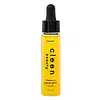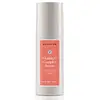What's inside
What's inside
 Key Ingredients
Key Ingredients

 Benefits
Benefits

 Concerns
Concerns

 Ingredients Side-by-side
Ingredients Side-by-side

Water
Skin ConditioningSodium Ascorbyl Phosphate
AntioxidantGlycerin
HumectantPropanediol
SolventSodium Hyaluronate
HumectantCarica Papaya Fruit Extract
Skin ConditioningLactobacillus/Papaya Fruit Ferment Extract
AbrasiveEvodia Rutaecarpa Fruit Extract
Skin ConditioningAnanas Sativus Fruit Extract
Skin ConditioningFerulic Acid
AntimicrobialCamellia Sinensis Leaf Extract
AntimicrobialCurcuma Longa Root Extract
MaskingVitis Vinifera Seed Extract
AntimicrobialMorus Alba Leaf Extract
Skin ConditioningGlycyrrhiza Glabra Root Extract
BleachingChamomilla Recutita Extract
Skin ConditioningPyrus Communis Fruit Extract
Skin ConditioningPrunus Armeniaca Fruit Extract
Skin ConditioningAllantoin
Skin ConditioningVanilla Planifolia Fruit Extract
Skin ConditioningRubus Idaeus Fruit Extract
AstringentCitrus Tangerina Peel Extract
AstringentCitrus Nobilis Fruit Extract
MaskingCitrus Grandis Peel Extract
AstringentCitrus Aurantium Dulcis Peel Extract
Emulsion StabilisingAnthemis Nobilis Flower Extract
MaskingTocopherol
AntioxidantHydroxyethylcellulose
Emulsion StabilisingXanthan Gum
EmulsifyingEthylhexylglycerin
Skin ConditioningDecyl Glucoside
CleansingSodium Nitrate
SoothingLauryl Glucoside
CleansingLeuconostoc/Radish Root Ferment Filtrate
AntimicrobialPolysorbate 60
EmulsifyingDisodium Phosphate
BufferingSodium Phosphate
BufferingPhenoxyethanol
PreservativeCitric Acid
BufferingAlcohol
AntimicrobialWater, Sodium Ascorbyl Phosphate, Glycerin, Propanediol, Sodium Hyaluronate, Carica Papaya Fruit Extract, Lactobacillus/Papaya Fruit Ferment Extract, Evodia Rutaecarpa Fruit Extract, Ananas Sativus Fruit Extract, Ferulic Acid, Camellia Sinensis Leaf Extract, Curcuma Longa Root Extract, Vitis Vinifera Seed Extract, Morus Alba Leaf Extract, Glycyrrhiza Glabra Root Extract, Chamomilla Recutita Extract, Pyrus Communis Fruit Extract, Prunus Armeniaca Fruit Extract, Allantoin, Vanilla Planifolia Fruit Extract, Rubus Idaeus Fruit Extract, Citrus Tangerina Peel Extract, Citrus Nobilis Fruit Extract, Citrus Grandis Peel Extract, Citrus Aurantium Dulcis Peel Extract, Anthemis Nobilis Flower Extract, Tocopherol, Hydroxyethylcellulose, Xanthan Gum, Ethylhexylglycerin, Decyl Glucoside, Sodium Nitrate, Lauryl Glucoside, Leuconostoc/Radish Root Ferment Filtrate, Polysorbate 60, Disodium Phosphate, Sodium Phosphate, Phenoxyethanol, Citric Acid, Alcohol
Water
Skin ConditioningGlycerin
HumectantPropanediol
SolventSodium Ascorbyl Phosphate
AntioxidantAscorbic Acid
AntioxidantGlutathione
Ananas Sativus Fruit Extract
Skin ConditioningCarica Papaya Fruit Extract
Skin ConditioningMangifera Indica Fruit Extract
Skin ConditioningTerminalia Ferdinandiana Fruit Extract
AntioxidantPleiogynium Timoriense Fruit Extract
Skin ConditioningPodocarpus Elatus Fruit Extract
Skin ConditioningAloe Barbadensis Leaf Juice
Skin ConditioningSodium Hyaluronate
HumectantCarbomer
Emulsion StabilisingTocopheryl Acetate
AntioxidantPhenoxyethanol
PreservativeCaprylyl Glycol
EmollientCitric Acid
BufferingHydroxyethylcellulose
Emulsion StabilisingSodium Hydroxide
BufferingBeta-Glucan
Skin ConditioningPotassium Sorbate
PreservativeHexylene Glycol
EmulsifyingSorbitol
HumectantXanthan Gum
EmulsifyingAlgin
MaskingBenzoic Acid
MaskingSorbic Acid
Preservative1,2-Hexanediol
Skin ConditioningSodium Benzoate
MaskingDisodium Phosphate
BufferingGold
Cosmetic ColorantPolysorbate 60
EmulsifyingSodium Phosphate
BufferingWater, Glycerin, Propanediol, Sodium Ascorbyl Phosphate, Ascorbic Acid, Glutathione, Ananas Sativus Fruit Extract, Carica Papaya Fruit Extract, Mangifera Indica Fruit Extract, Terminalia Ferdinandiana Fruit Extract, Pleiogynium Timoriense Fruit Extract, Podocarpus Elatus Fruit Extract, Aloe Barbadensis Leaf Juice, Sodium Hyaluronate, Carbomer, Tocopheryl Acetate, Phenoxyethanol, Caprylyl Glycol, Citric Acid, Hydroxyethylcellulose, Sodium Hydroxide, Beta-Glucan, Potassium Sorbate, Hexylene Glycol, Sorbitol, Xanthan Gum, Algin, Benzoic Acid, Sorbic Acid, 1,2-Hexanediol, Sodium Benzoate, Disodium Phosphate, Gold, Polysorbate 60, Sodium Phosphate
 Reviews
Reviews

Ingredients Explained
These ingredients are found in both products.
Ingredients higher up in an ingredient list are typically present in a larger amount.
Ananas Sativus Fruit Extract comes from the pineapple fruit. Pineapples are native to South America. The components of pineapple give it mild exfoliating and skin nourishing properties.
Pineapples contain Vitamin C, Vitamin B6, copper, potassium, niacin, and other minerals. It also contains many phytochemicals, including ferulic acid, coumaric acid, arbutin, and more. These help condition the skin.
Bromelain can be found in all parts of a pineapple. It is a mixture of enzymes and is mildly exfoliating.
Learn more about Ananas Sativus Fruit ExtractCarica Papaya Fruit Extract comes from the papaya fruit. Papayas were first domesticated in Mexico and Central America.
This fruit extract contains papain and chymopapain, two types of enzymes. These enzyme have exfoliating and anti-inflammatory properties. One study shows papain may help reduce scarring.
Papaya is also a rich source of antioxidants. Antioxidants protect your skin against damage from free-radical molecules. This may help protect against signs of aging. One antioxidant present in papayas is lycopene.
Papaya also contains Vitamin A, also known as retinol.
While papaya is used as an ingredient to help lighten skin, research is limited on this.
The seeds of papaya have been found to have anti-fungal activity.
Learn more about Carica Papaya Fruit ExtractCitric Acid is an alpha hydroxy acid (AHA) naturally found in citrus fruits like oranges, lemons, and limes.
Like other AHAs, citric acid can exfoliate skin by breaking down the bonds that hold dead skin cells together. This helps reveal smoother and brighter skin underneath.
However, this exfoliating effect only happens at high concentrations (20%) which can be hard to find in cosmetic products.
Due to this, citric acid is usually included in small amounts as a pH adjuster. This helps keep products slightly more acidic and compatible with skin's natural pH.
In skincare formulas, citric acid can:
While it can provide some skin benefits, research shows lactic acid and glycolic acid are generally more effective and less irritating exfoliants.
Most citric acid used in skincare today is made by fermenting sugars (usually from molasses). This synthetic version is identical to the natural citrus form but easier to stabilize and use in formulations.
Read more about some other popular AHA's here:
Learn more about Citric AcidDisodium Phosphate is a water-soluble powder used as a pH adjuster.
Glycerin is already naturally found in your skin. It helps moisturize and protect your skin.
A study from 2016 found glycerin to be more effective as a humectant than AHAs and hyaluronic acid.
As a humectant, it helps the skin stay hydrated by pulling moisture to your skin. The low molecular weight of glycerin allows it to pull moisture into the deeper layers of your skin.
Hydrated skin improves your skin barrier; Your skin barrier helps protect against irritants and bacteria.
Glycerin has also been found to have antimicrobial and antiviral properties. Due to these properties, glycerin is often used in wound and burn treatments.
In cosmetics, glycerin is usually derived from plants such as soybean or palm. However, it can also be sourced from animals, such as tallow or animal fat.
This ingredient is organic, colorless, odorless, and non-toxic.
Glycerin is the name for this ingredient in American English. British English uses Glycerol/Glycerine.
Learn more about GlycerinHydroxyethylcellulose is used to improve the texture of products. It is created from a chemical reaction involving ethylene oxide and alkali-cellulose. Cellulose is a sugar found in plant cell walls and help give plants structure.
This ingredient helps stabilize products by preventing ingredients from separating. It can also help thicken the texture of a product.
This ingredient can also be found in pill medicines to help our bodies digest other ingredients.
Learn more about HydroxyethylcellulosePhenoxyethanol is a preservative that has germicide, antimicrobial, and aromatic properties. Studies show that phenoxyethanol can prevent microbial growth. By itself, it has a scent that is similar to that of a rose.
It's often used in formulations along with Caprylyl Glycol to preserve the shelf life of products.
Polysorbate 60 is used to help stabilize products. It is a surfactant and emulsifier. These properties help keep ingredients together in a product. Surfactants help reduce surface tension between ingredients with different states, such as liquids and solids. Emulsifiers help prevent oils and waters from separating.
Polysorbate 60 is sorbitol-based and created from the ethoxylation of sorbitan. Ethoxylation is a chemical reaction used to add ethylene oxide. Sorbitan is a the dehydrated version of sorbitol, a sugar found in fruits.
In this case, the 60 comes from reacting 60 units of ethylene oxide with sorbitan.
Polysorbates are commonly used in medicine and foods.
Learn more about Polysorbate 60Propanediol is an all-star ingredient. It softens, hydrates, and smooths the skin.
It’s often used to:
Propanediol is not likely to cause sensitivity and considered safe to use. It is derived from corn or petroleum with a clear color and no scent.
Learn more about PropanediolSodium Ascorbyl Phosphate is a form of Vitamin C. It is the salt of ascorbic acid.
This ingredient is more gentle than ascorbic acid. It is also more stable when exposed to light and oxygen.
Vitamin C helps reduce redness, improve skin texture, reduce the effects of aging, reduce the visibility of dark spots, and brighten skin.
Your skin uses Vitamin C to produce collagen and collagen production plays a role in having a strong skin barrier and plump skin. As an antioxidant, this ingredient also helps reduce the signs of aging such as fine-lines and wrinkles.
VItamin C helps brighten skin by blocking the process of skin darkening.
In a 2011 study, Sodium Ascorbyl Phosphate was found to have antibacterial properties. This may help treat acne.
Read more about other types of Vitamin C:
Learn more about Sodium Ascorbyl PhosphateSodium Hyaluronate is hyaluronic acid's salt form. It is commonly derived from the sodium salt of hyaluronic acid.
Like hyaluronic acid, it is great at holding water and acts as a humectant. This makes it a great skin hydrating ingredient.
Sodium Hyaluronate is naturally occurring in our bodies and is mostly found in eye fluid and joints.
These are some other common types of Hyaluronic Acid:
Learn more about Sodium HyaluronateSodium phosphate is a group of inorganic sodium salts (mono, di, and tri-sodium phosphate). It has pH buffering, chelating, and stabilizing properties.
This means it helps maintain a formula's acidity, enhances preservative performance, and prevents unwanted changes caused by metal ions or hard water.
Sodium phosphate is considered safe for use in cosmetics according to the Cosmetic Ingredient Review (CIR); it also has a long-established food-grade safety rating as well.
Though some sources claim sodium phosphate can help "energize skin cells", this claim is not strongly supported by independent scientific studies.
Learn more about Sodium PhosphateWater. It's the most common cosmetic ingredient of all. You'll usually see it at the top of ingredient lists, meaning that it makes up the largest part of the product.
So why is it so popular? Water most often acts as a solvent - this means that it helps dissolve other ingredients into the formulation.
You'll also recognize water as that liquid we all need to stay alive. If you see this, drink a glass of water. Stay hydrated!
Learn more about WaterXanthan gum is used as a stabilizer and thickener within cosmetic products. It helps give products a sticky, thick feeling - preventing them from being too runny.
On the technical side of things, xanthan gum is a polysaccharide - a combination consisting of multiple sugar molecules bonded together.
Xanthan gum is a pretty common and great ingredient. It is a natural, non-toxic, non-irritating ingredient that is also commonly used in food products.
Learn more about Xanthan Gum